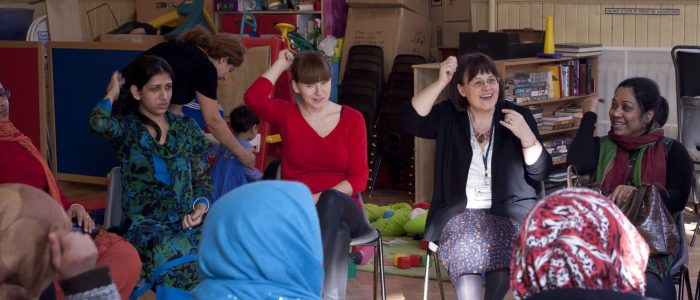The challenge that never was

Before joining FaithAction, I had worked and volunteered at various community arts organisations, the majority of which worked with vulnerable groups or young people. This included puppet making with domestic abuse survivors, exploring theatre with children experiencing social exclusion and discussing social issues through art with teenagers from an economically deprived estate. What seemed to be the case with most small organisations was that the work was interesting and rewarding yet undeniably challenging!
The challenge always seemed like something not fully tangible; for example, how could I challenge a teenager’s bad behaviour without them feeling attacked and never seeing them again? How could I make sure a lady who had become emotional during a craft workshop didn’t feel too embarrassed to come back the following week? Ultimately, the challenge was not delivering a service but was to create an environment that people felt safe to come back to.
Before volunteering as a mentor for children experiencing mental health issues, I completed training on ‘attachment theory’, which focuses on the importance of strong and enduring relationships in early childhood. Although it is most often talked about in relation to childhood development, the interesting thing for me was that it doesn’t have to come from a parent, it doesn’t have to be reciprocated, but it does have to be consistent. As a mentor, missing a week because you were tired, busy or didn’t feel like it, wasn’t an option. It was too important that we kept the continuity with our mentee. If my mentee spent the whole session being disruptive and explosive, I would still be there the next week. When my mentee told me to go away, that he didn’t need me, I would still be there the next week. His behaviour did not impact whether I showed up for him or not, it was a given. Having the knowledge that someone would be there to see him no matter his previous behaviour good or bad gave him a sense of security in this group. He now had the freedom to explore, engage and express himself both negatively and positively without fear of abandonment. He felt safe. Seeing this attachment work so well, I have consciously tried to employ this approach in community-based work ever since.
Fast forward a couple of years, I started working at FaithAction, knowing little about the organisation beyond what my actual role would be as a Creative English trainer. As I was getting stuck in, there would often be little moments that would capture my attention. I was delivering training in a mosque in East London to a new group of Creative English facilitators when one of these moments appeared. I watched two friends, chatting and catching up like it had been only days, to find out one of them hadn’t actually attended the mosque in years. The fact that he seamlessly slotted back in without question or pause was something I had not witnessed before.
A few weeks later, on a ridiculously hot day, I walked into a silent church with people waiting for me. As I was setting up two volunteers began talking politics, disagreeing wholeheartedly and unapologetically. Over the next two days of training, I watched the two of them, an 80-year-old man and a younger woman, disagree on nearly everything. Despite this, they were clearly friends. I saw one offer a seat, the other a cup of tea, a warm hug, a teasing joke. Another instance for me to pause.
Finally, back at the office, I was talking with a colleague who mentioned she had to leave her family home as a teenager. “Wow, you must’ve been so scared about where you’d go?” I assumed out loud. “Oh no, I never really worried about that”, she replied casually. She didn’t need to worry about having nowhere to live because she knew there would be someone from her church who would help her out, and they did.
All of these stories stuck with me for the same reason. What could have become an awkward reunion, a hostile training session, and a life disrupting event, didn’t. The common thread was that they were all in faith-based organisations that have perfectly established an environment where people can go away and come back, have headbutting debates and still be friends, and can ask for help when they have nowhere else to go.
The challenge I thought I had found with ‘most small organisations’ was not a challenge at all. Simply by being there and being consistent, faith-based organisations have naturally created a space where people feel loved, accepted and safe.


